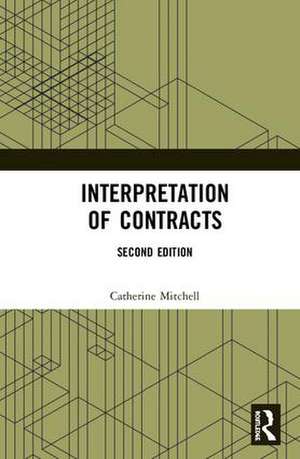Interpretation of Contracts
Autor Catherine Mitchellen Limba Engleză Hardback – 15 aug 2018
The original work examined various issues surrounding the question of how contracts should be interpreted by courts, in particular focusing on the law of contract interpretation following Lord Hoffmann’s exposition of the principles of contextual interpretation in Investors Compensation Scheme Ltd v West Bromwich Building Society [1998] 1 WLR 896. As with the original, this new edition provides an overview of the subject, concentrating on elements of controversy and disagreement, rather than a detailed analysis of all the contract law rules and doctrines that might be regarded as interpretative in one sense or another. The book will be concerned with interpretation of contracts generally (following the rule that there are not different rules of interpretation for different kinds of contracts), but with reference to commercial contracts in particular, since this is the area in which the contextual interpretative approach was developed, and where it has most relevance.
The overall aim of the second edition remains the same as the first – to produce an accessible and readable guide to contract interpretation for law students, scholars and practitioners.
| Toate formatele și edițiile | Preț | Express |
|---|---|---|
| Paperback (1) | 383.33 lei 6-8 săpt. | |
| Taylor & Francis – 30 iun 2020 | 383.33 lei 6-8 săpt. | |
| Hardback (1) | 1001.07 lei 6-8 săpt. | |
| Taylor & Francis – 15 aug 2018 | 1001.07 lei 6-8 săpt. |
Preț: 1001.07 lei
Preț vechi: 1220.81 lei
-18% Nou
Puncte Express: 1502
Preț estimativ în valută:
191.58€ • 208.03$ • 160.92£
191.58€ • 208.03$ • 160.92£
Carte tipărită la comandă
Livrare economică 22 aprilie-06 mai
Preluare comenzi: 021 569.72.76
Specificații
ISBN-13: 9781138789722
ISBN-10: 1138789720
Pagini: 212
Dimensiuni: 156 x 234 x 13 mm
Greutate: 0.48 kg
Ediția:Revised
Editura: Taylor & Francis
Colecția Routledge-Cavendish
Locul publicării:Oxford, United Kingdom
ISBN-10: 1138789720
Pagini: 212
Dimensiuni: 156 x 234 x 13 mm
Greutate: 0.48 kg
Ediția:Revised
Editura: Taylor & Francis
Colecția Routledge-Cavendish
Locul publicării:Oxford, United Kingdom
Public țintă
Postgraduate and UndergraduateCuprins
Table of Contents
Table of cases
Preface to first edition
Preface to second edition
Chapter 1 The Nature of Contract Interpretation
Introduction
What is interpretation?
A general theory of interpretation?
Interpretation and meaning
Context and interpretation
What is a contract?
Interpretation and contractual power
The range of interpretation problems
Why do contractual interpretation disputes exist?
Foundations of contract interpretation
Conclusion
Chapter 2 The Rise (and Fall?) of Contextual Interpretation
Literalism and rules in contracts interpretation
The contextualist shift
Lord Hoffmann’s restatement
Implications of Lord Hoffmann’s contextualism
The meaning communicated to a reasonable person
No need for ambiguity before examining the background
Mistakes can be corrected by contextual interpretation
The role of business common sense
Contextualism subsumes literalism
Contextual interpretation subsumes doctrine
Contextual interpretation in context
Accessing the ‘real’ agreement
Interdisciplinarity in law
Conclusion
Chapter 3 Divisions and Disputes in Contract Interpretation
Retreating from contextualism
Arnold v Britton
The role of ambiguity
What the words say/what the language communicates
Identifying the relevant context
Commercial reasonableness after Arnold v Britton
Reasonable person or pedantic lawyer?
The limitations on the contract background
Common intentions of the parties
Admissibility of prior negotiations
Subjectivity
Costs
Helpfulness, relevance and the legal framework
Should the rule be reformed?
Subsequent conduct
The retreat from contextualism in context
Contract complexity
Maintaining competitive edge
Waning European influence
Conclusion
Chapter 4 The Scope of Contract Interpretation
Interpretation or something else?
Interpretation and implied terms
A-G of Belize v Belize Telecom
Connections and disconnections between interpretation
and implication
What turns on the division between implication and
interpretation?
Interpretation and construction
Interpretation and rectification
Conclusion
Chapter 5 Formalism and Contract Interpretation
Indications of formalism in English contract law
Form and interpretation
The rise of neo-formalism
Neo-formalism: empirical, theoretical or pragmatic?
Empirically defended formalism
Theoretically defended formalism
Pragmatically defended formalism
The preference for formalism and textualism
The costs of contextualism
Judicial error
Flexible norms vs legal norms
The existence of contextual materials
Conclusion
Chapter 6 Controlling Contract Interpretation
General considerations
Courts, not the parties, interpret contracts
The limits of formalism
Choosing between formalist or contextualist contracting
strategies
Formalist interpretation of contractual standards
Contracting for textualism
Entire agreement clauses (EACs)
Should an EAC influence interpretation?
Resurrecting the parol evidence rule
Identifying and interpreting obligations
Evading the EAC
The impossibility of dispensing with context
Conclusion
Bibliography
Index
Table of cases
Preface to first edition
Preface to second edition
Chapter 1 The Nature of Contract Interpretation
Introduction
What is interpretation?
A general theory of interpretation?
Interpretation and meaning
Context and interpretation
What is a contract?
Interpretation and contractual power
The range of interpretation problems
Why do contractual interpretation disputes exist?
Foundations of contract interpretation
Conclusion
Chapter 2 The Rise (and Fall?) of Contextual Interpretation
Literalism and rules in contracts interpretation
The contextualist shift
Lord Hoffmann’s restatement
Implications of Lord Hoffmann’s contextualism
The meaning communicated to a reasonable person
No need for ambiguity before examining the background
Mistakes can be corrected by contextual interpretation
The role of business common sense
Contextualism subsumes literalism
Contextual interpretation subsumes doctrine
Contextual interpretation in context
Accessing the ‘real’ agreement
Interdisciplinarity in law
Conclusion
Chapter 3 Divisions and Disputes in Contract Interpretation
Retreating from contextualism
Arnold v Britton
The role of ambiguity
What the words say/what the language communicates
Identifying the relevant context
Commercial reasonableness after Arnold v Britton
Reasonable person or pedantic lawyer?
The limitations on the contract background
Common intentions of the parties
Admissibility of prior negotiations
Subjectivity
Costs
Helpfulness, relevance and the legal framework
Should the rule be reformed?
Subsequent conduct
The retreat from contextualism in context
Contract complexity
Maintaining competitive edge
Waning European influence
Conclusion
Chapter 4 The Scope of Contract Interpretation
Interpretation or something else?
Interpretation and implied terms
A-G of Belize v Belize Telecom
Connections and disconnections between interpretation
and implication
What turns on the division between implication and
interpretation?
Interpretation and construction
Interpretation and rectification
Conclusion
Chapter 5 Formalism and Contract Interpretation
Indications of formalism in English contract law
Form and interpretation
The rise of neo-formalism
Neo-formalism: empirical, theoretical or pragmatic?
Empirically defended formalism
Theoretically defended formalism
Pragmatically defended formalism
The preference for formalism and textualism
The costs of contextualism
Judicial error
Flexible norms vs legal norms
The existence of contextual materials
Conclusion
Chapter 6 Controlling Contract Interpretation
General considerations
Courts, not the parties, interpret contracts
The limits of formalism
Choosing between formalist or contextualist contracting
strategies
Formalist interpretation of contractual standards
Contracting for textualism
Entire agreement clauses (EACs)
Should an EAC influence interpretation?
Resurrecting the parol evidence rule
Identifying and interpreting obligations
Evading the EAC
The impossibility of dispensing with context
Conclusion
Bibliography
Index
Notă biografică
Catherine Mitchell is a Reader in Private Law at Birmingham Law School, University of Birmingham. She has published widely on contract law issues in the UK and internationally.
Descriere
This new edition is an accessible and readable guide to contract interpretation for law students, scholars and practitioners.







